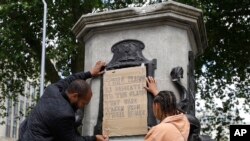More statues of imperialist figures could be removed from Britain's streets, following the unauthorized felling of a monument to slave trader Edward Colston in the city of Bristol, the mayor of London said Tuesday.
Mayor Sadiq Khan said he was setting up a commission to ensure the city's monuments reflected its diversity. The Commission for Diversity in the Public Realm will review statues, murals, street art, street names and other memorials and consider which legacies should be celebrated, the mayor's office said.
"It is an uncomfortable truth that our nation and city owes a large part of its wealth to its role in the slave trade and while this is reflected in our public realm, the contribution of many of our communities to life in our capital has been willfully ignored," Khan said.
Debate over who should be publicly commemorated has been reignited in Britain by the felling of a monument to Colston, a 17th-century slave trader and philanthropist. His bronze statue was pulled from its perch in Bristol, southwest England, during a Black Lives Matter protest on Sunday and dumped in the city's harbor.
Many Bristolians welcomed the statue's removal, but the British government called it an act of vandalism and urged police to prosecute the perpetrators.
British Prime Minister Boris Johnson acknowledged that it was "a cold reality" that people of color in Britain experienced discrimination, and promised his government was committed to "eradicating prejudice and creating opportunity."
But he said those who attacked police or desecrated public monuments should face "the full force of the law."
Colston's demise has reinvigorated Oxford University campaigners calling for the removal of a statue of Cecil Rhodes, a Victorian imperialist in southern Africa who made a fortune from mines and endowed the university's Rhodes scholarships.
As the Rhodes Must Fall group planned to protest Tuesday at the statue, a banner erected in Oxford declared: "Rhodes, you're next."
In Edinburgh, Scotland, there are calls to remove a statue of Henry Dundas, an 18th-century politician who delayed Britain's abolition of slavery by 15 years.
The leader of Edinburgh City Council, Adam McVey, said he would "have absolutely no sense of loss if the Dundas statue was removed and replaced with something else or left as a plinth."
Some historical figures have more complex legacies. At weekend protests in London, demonstrators scrawled "was a racist" on a statue of Winston Churchill. Britain's wartime prime minister is revered as the man who led the country to victory against Nazi Germany. But he was also a staunch defender of the British Empire and expressed racist views.
Khan suggested Churchill's statue should stay up.
"Nobody's perfect, whether it's Churchill, whether it's Gandhi, whether it's Malcolm X," he told the BBC, adding that schools should teach children about historical figures "warts and all."
"But there are some statues that are quite clear cut," Khan said. "Slavers are quite clear cut in my view, plantation owners are quite clear cut."




